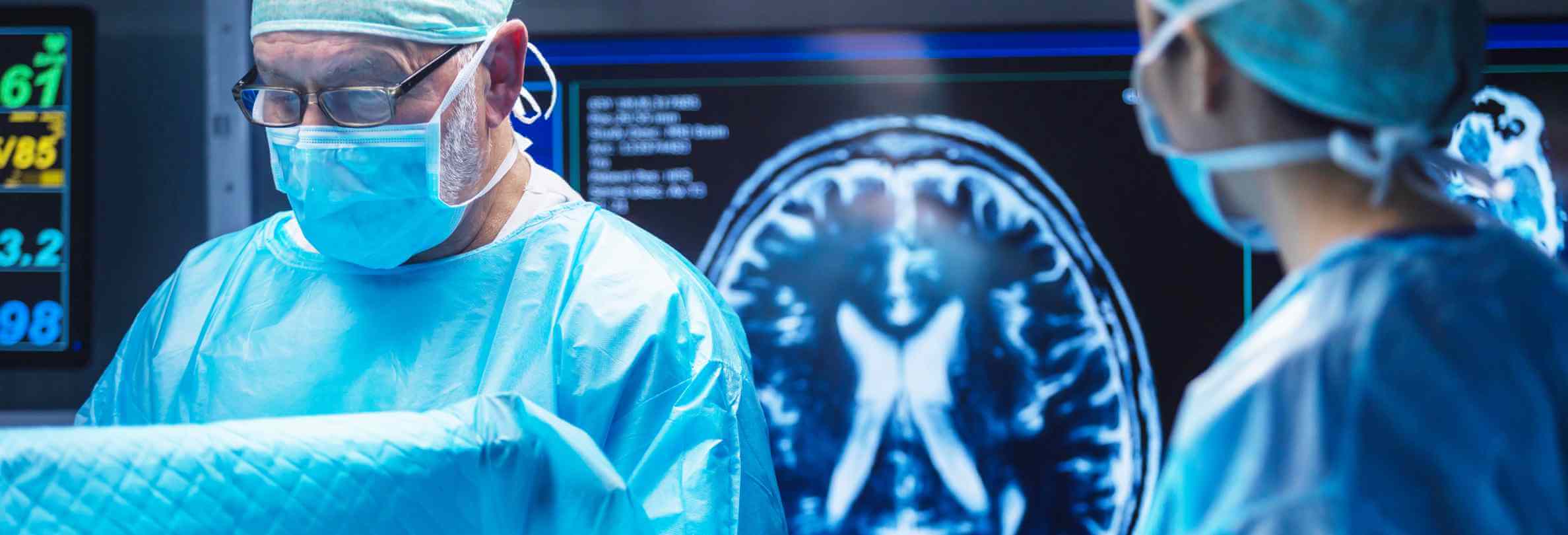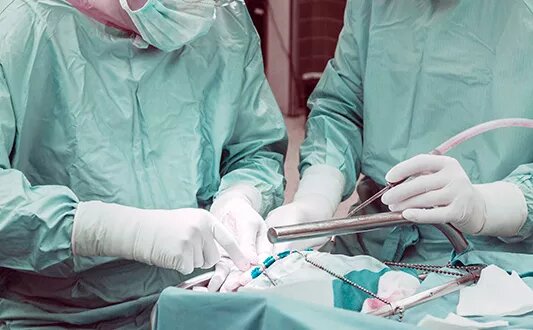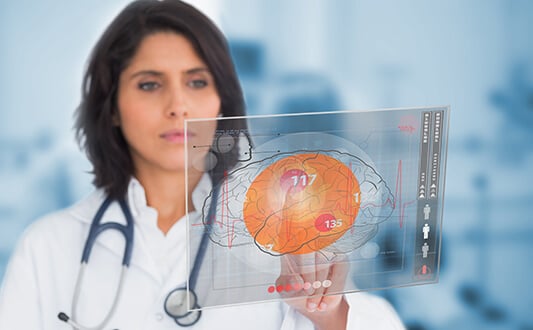Neuropsychiatric disorders significantly worsen the quality of life, not only for the patient but also for their family. Treatment for these diseases is long and is associated with many side effects and relapses. However, it does not guarantee the desired result. Deep brain stimulation may be indicated to the patient in such cases.
Deep brain stimulation is a modern and promising method of therapy for mental and neurological diseases resistant to standard treatment. Up to 70% of patients for whom drug treatment has failed report significant improvement after using brain stimulation.
Deep brain stimulation can be used to treat a number of conditions, including epilepsy, Parkinson's disease, essential tremor, some types of dystonia, obsessive-compulsive personality disorder, Tourette's syndrome, depression, and addiction.
Undergoing treatment in Germany would be the right decision, because it was the German doctors Fritsch and Hitzig who laid the foundation for this method back in 1970.
Content
- What is deep brain stimulation?
- Who may be a candidate for deep brain stimulation?
- Where can I undergo treatment?
- Conclusion
What is deep brain stimulation?
Deep brain stimulation is a neurosurgical treatment method that involves implanting neurostimulators (electrodes) into specific areas of the brain. Subsequently, neurostimulators send electrical impulses to the desired areas of the brain. The most common of them are the basal ganglia system and neuronal pathways. Impulses suppress or functionally block the excessive activity of these areas, which is the cause of mental or neurological conditions.
Before performing an operation to implant a neurostimulator, an experienced team of doctors selects a special "helmet" for the head, which is called a stereotactic frame. Its function is to keep the head still during the procedure. Neuroimaging using CT or MRI scanning is then performed, as a result of which doctors receive the most accurate 3D map of the brain. A three-dimensional coordinate system created on the basis of external reference points allows for maximum accuracy and minimal trauma when implanting a neurostimulator and therefore minimizes the risks associated with the surgical intervention.
Electrodes are implanted through microscopic holes in the skull. The patient remains conscious throughout the operation, which provides neurosurgeons with complete control over the process and also allows them to avoid damaging other areas of the brain. In this case, the patient does not feel any pain because the area of the holes is injected with an anesthetic before the procedure, and there are no pain nerve endings in the brain itself.
The benefits of using this method to stimulate the brain include the following:
- Possibility of controlling the strength and frequency of impulses without any repeated intervention. The leading psychiatrist can remotely change the therapy protocol, adjusting it to the patient and their needs.
- Absence of long-term side effects during treatment. Deep brain stimulation is a low-risk therapy. The side effects of this treatment are mainly associated with the implantation itself and disappear within one to two weeks after surgery.
Who may be a candidate for deep brain stimulation?
Deep brain stimulation with implantation of a neurostimulator is more than just a procedure in neurosurgery. It requires a series of diagnostic tests, procedures, and consultations both before and after surgery. Therefore, patients interested in this treatment method should be willing to devote time to the process.
The Booking Health company will take care of all your worries about organizing a trip to Germany and back, finding doctors and hospitals, and accompanying you at the stage of postoperative treatment. Patients with the following diagnoses should have a consultation regarding the possibility of treatment with brain stimulation:
Obsessive disorders / obsessive-compulsive personality disorder
Obsessive-compulsive disorder is characterized by the presence of obsessive or functionally negative ideas (obsessions) and/or repeated mental or physical behaviors (compulsions). A treatment protocol includes antidepressants and cognitive behavioral therapy. This treatment is not only time-consuming and expensive but also has a number of side effects that reduce the patient's quality of life. Nevertheless, obsessive-compulsive personality disorder often remains resistant because 60% of patients do not respond well to it.
Deep brain stimulation becomes the treatment of choice for such patients. Treatment with deep stimulation results in a reduced frequency of obsessions and compulsions in some patients already after 3 months: about 50% report a reduction in symptoms of 35% or more (YBOCS scale), and with stimulation over 12 months of treatment, up to 70% of patients achieve the same results.
Epilepsy
Epilepsy is a chronic neurological disease that is characterized by recurrent seizures or abnormal bursts of electrical activity in the brain that may cause sudden movements, strange sensations or emotions, unusual behavior, and/or loss of consciousness.
Treatment of epilepsy is carried out with anticonvulsants. Although anticonvulsant therapy helps a large number of people, about a third of patients do not receive adequate symptom relief. Approximately 10% of patients experience excellent results after neurosurgical removal of the area of the brain that initiates seizures. Deep stimulation may be an effective alternative to the patients for whom it is difficult to determine the region of the brain responsible for seizures.
Deep brain stimulation as an option for the treatment of epilepsy has been used in Germany since 2018 and currently shows excellent results.
Addictions
Many years of research have helped to gain an understanding of the neural networks responsible for the formation of addiction. Stimulating these systems through alcohol or nicotine causes the release of neurotransmitters, which in turn gives a feeling of satisfaction. The problem is that the human brain adapts to the stimulus, which in turn leads to the need to increase the dose of alcohol/nicotine and severe abstinence in the absence of new intake. A vicious circle is formed, which we propose to break with the help of brain stimulation.
Brain stimulation treatment makes it possible to activate these same networks without the use of a substance that has developed an addiction. We can thus remove the negative factor in the form of alcohol/nicotine, while maintaining the concentration of neurotransmitters we need. Subsequently, the strength of stimulation can be gradually reduced to allow the body to properly adapt and minimize the possibility of relapse.
Depressive disorder
According to various sources, from 7 to 15% of the European population suffers from depression. It is a common cause of disability in middle- and high-income countries.
Treatment consists of antidepressants and psychotherapy, but despite its availability, about 66% of patients do not notice any significant improvement after 1 or even 3 courses of therapy. An even bigger problem is the recurrence of the disease, which every second patient faces.
If you fall into any of the groups listed above, deep brain stimulation may be recommended for you. It should be clarified that in the case of depression, brain stimulation is not done to replace standard therapy but as a method of increasing sensitivity to medications.
Studies have found that patients with a neurostimulator have an increased response rate to antidepressants by 60%, which corresponds to a 50% or more reduction in the severity of depressive symptoms.
Parkinson's disease
The following three groups of patients with Parkinson's disease are most likely to benefit from brain stimulation treatment:
- Patients with uncontrollable tremors for whom drug treatment has failed
- Patients who, while taking medications, experience strong motor fluctuations and dyskinesias, that is, uncontrolled movements, despite the adjustment of drug dose
- Patients whose symptoms respond only to high doses of drugs but cannot tolerate them due to side effects
Dystonia
Dystonia is considered a rare motor neurological disorder. Symptoms include abnormal postures and twisting body movements. Research suggests that patients with this condition respond well to brain stimulation when drug treatments do not provide any relief. The response to stimulation depends on the underlying cause of the disease, such as genetic, medical, or other factors. If the cause is unknown, your doctor will likely need the results of additional diagnostic tests.
Essential tremor
Essential tremor is the most common movement disorder. People over 60 years of age are mostly affected. The disease is characterized by constant trembling of the hands and significantly reduces the quality of life of patients, limiting their ability to perform simple daily activities. Patients cannot dress, eat, or shower on their own. In such situations, brain stimulation can greatly improve people's daily lives and help them take care of themselves.
Where can I undergo treatment?
Effective treatment of mental and neurological diseases resistant to standard therapy requires not only the constant professional development of doctors in their field but also the tireless search for new treatment options in collaboration with specialists in various fields. Clinical bases in Germany provide their doctors with the most advanced technologies and state-of-the-art equipment and also provide the opportunity for continuous training and improvement of professional skills.
The method of deep brain stimulation with implantation of a neurostimulator, which is not available in every country, has been actively used in Germany for a long time by doctors at large medical centers, including:
- Hospital Cologne-Merheim, Department of Adult and Pediatric Neurosurgery, Spinal Surgery
- Charite University Hospital Berlin, Department of Adult and Pediatric Neurosurgery
- Beta Clinic Bonn, Department of Neurosurgery and Spinal Surgery
- University Hospital Freiburg, Department of Adult and Pediatric Neurosurgery
- University Hospital Frankfurt am Main, Department of Adult and Pediatric Neurosurgery
- University Hospital Ulm, Department of Neurosurgery
You are welcome to contact specialists from the Booking Health company to find out more about hospitals, doctors, and treatment prices, and also make an appointment for your preferred travel dates.
Conclusion
Deep brain stimulation is a modern and extremely promising method of treating mental and neurological disorders, and interest in it is growing. The method can be used as a complete replacement or addition to drug treatment for various diseases.
It is not yet possible to classify deep brain stimulation as the first-line therapy, but if you have already undergone several treatment options and there is no effect, do not give up. Contact Booking Health to choose the most suitable treatment method and hospital. The Booking Health team offers an all-inclusive package that includes:
- Finding the best hospital and making an appointment with a doctor for your preferred dates
- Maintaining financial records and reducing the cost of treatment due to the absence of fees for foreigners
- A personal manager who will help solve any problem
- Organization of consultations with related specialists
- Support of an interpreter
- Assistance in obtaining a visa
- Organization of flights and transfers
The Booking Health specialists will make every effort to ensure your comfort and will remain in touch with you until your successful return home after the completion of treatment.
Choose treatment abroad and you will for sure get the best results!
Authors:
The article was edited by medical experts, board certified doctors Dr. Nadezhda Ivanisova and Dr. Vadim Zhiliuk. For the treatment of the conditions referred to in the article, you must consult a doctor; the information in the article is not intended for self-medication!
Our editorial policy, which details our commitment to accuracy and transparency, is available here. Click this link to review our policies.
Sources:
Read:
Top 10 Best Hospitals in Germany
Don't know where to start?
Contact Booking Health






